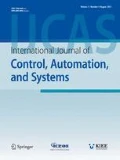Abstract
Stochastic hybrid systems have several applications such as biological systems and communication networks, but it is difficult to consider control of general stochastic hybrid systems. In this paper, a class of discrete-time stochastic hybrid systems, in which only discrete dynamics are stochastic, is considered. For this system, a solution method for the optimal control problem with probabilistic constraints is proposed. Probabilistic constraints guarantee that the probability that the continuous state reaches a given unsafe region is less than a given constant. In the propose method, first, continuous state regions, from which the state reaches a given unsafe region, are computed by a backward-reachability graph. Next, mixed integer quadratic programming problems with constraints derived from the backward-reachability graph are solved. The proposed method can be applied to model predictive control.
Similar content being viewed by others
References
A. Abate, J. Lygeros, and S. Sastry Eds., Proc. of the 47th IEEE Conf. on Decision and Control/Workshop on Stochastic Hybrid Systems: Theory and Applications, 2008.
H. A. P. Blom and J. Lygeros Eds., Stochastic Hybrid Systems: Theory and Safety Critical Applications, Lecture Notes in Control and Information Sciences 337, 2006.
J. P. Hespanha, “Why should I care about stochastic hybrid systems?,” Proc. of the 49th IEEE Conf. on Decision and Control, Semi-plenary talk, 2010.
J. P. Hespanha, “A model for stochastic hybrid systems with application to communication networks,” Nonlinear Analysis, vol. 62, pp. 1353–1383, 2005.
M. L. Bujorianu and J. Lygeros, “General stochastic hybrid systems: modelling and optimal control,” Proc. of the 43rd IEEE Conf. on Decision and Control, pp. 1872–1877, 2004.
C. Song and P. Li, “Near optimal control for a class of stochastic hybrid systems,” Automatica, vol. 46, pp. 1553–1557, 2010.
W. Zhang, J. Hu, and J. Lian, “Quadratic optimal control of switched linear stochastic systems,” Systems & Control Letters, vol. 59, pp. 736–744, 2010.
A. Bemporad and S. Di Cairano, “Model-predictive control of discrete hybrid stochastic automata,” IEEE Trans. on Automatic Control, vol. 56, no. 6, pp. 1307–1321, 2011.
P. Bolzern, P. Colaneri, and G. De Nicolao, “Markov Jump Linear Systems with switching transition rates: mean square stability with dwell-time,” Automatica, vol. 46, pp. 1081–1088, 2010.
K. Kobayashi and K. Hiraishi, “MLD-Based modeling and MPC of discrete-time hybrid systems with stochastic mode transitions,” Proc. of the 19th IEEE Conf. on Control Applications (as a part of 2010 MSC), pp. 1331–1336, 2010.
L. Shi, A. Abate, and S. Sastry, “Optimal control of a class of stochastic hybrid systems,” Proc. of the 43rd IEEE Conf. on Decision and Control, pp. 1842–1847, 2004.
F. Adamek, M. Sobotka, and O. Stursberg, “Stochastic optimal control for hybrid systems with uncertain discrete dynamics,” Proc. of the 4th IEEE Conf. on Automation Science and Engineering, pp. 23–28, 2008.
A. Bemporad and M. Morari, “Control of systems integrating logic, dynamics, and constraints,” Automatica, vol. 35, pp. 407–427, 1999.
A. Abate, M. Prandini, J. Lygeros, and S. Sastry, “Probabilistic reachability and safety for controlled discrete time stochastic hybrid systems,” Automatica, vol. 44, pp. 2724–2734, 2008.
http://www.inrialpes.fr/pop-art/people/bjeannet/new-polka/html/polka.html
http://www-01.ibm.com/software/integration/optimization/cplex-optimizer/
K. Kobayashi and J. Imura, “Minimality of finite automata representation in hybrid systems control,” Proc. of the 10th Int’l Conf. on Hybrid Systems: Computation and Control, Lecture Note in Computer Science 4416, pp. 343–356, Springer, 2007.
R. Alur, T. A. Henzinger, G. Lafferriere, and G. J. Pappas, “Discrete abstractions of hybrid systems,” Proc. of the IEEE, vol. 88, no. 7, pp. 971–984, 2000.
Author information
Authors and Affiliations
Corresponding author
Additional information
Recommended by Editorial Board member Young Soo Suh under the direction of Editor Young Il Lee.
This journal was partially supported by the JSPS Grant-in-Aid for Young Scientists (B) 23760387.
Koichi Kobayashi received his M.E. degree from Hosei University in 2000, and his D.E. degree from Tokyo Institute of Technology in 2007. From 2000 to 2004, he worked at Nippon Steel Corporation. He is currently an Assistant Professor at School of Information Science, Japan Advanced Institute of Science and Technology. His research interests include control of discrete event and hybrid systems. He is a member of the SICE, ISCIE, IEICE, and IEEE.
Koichiro Matou received his master degree from Japan Advanced Institute of Science and Technology in 2011. His research interests include control of hybrid systems.
Kunihiko Hiraishi received his B.E. degree from the Tokyo Institute of Technology in 1983, an M.E. degree in 1985, and a D.E. degree in 1990. He is currently a Professor at School of Information Science, Japan Advanced Institute of Science and Technology. His research interests include discrete event systems and formal verification. He is a member of the IEEE, IEICE, SICE, and IPSJ.
Rights and permissions
About this article
Cite this article
Kobayashi, K., Matou, K. & Hiraishi, K. Probabilistic-constrained optimal control of a class of stochastic hybrid systems. Int. J. Control Autom. Syst. 10, 897–904 (2012). https://doi.org/10.1007/s12555-012-0505-3
Received:
Revised:
Accepted:
Published:
Issue Date:
DOI: https://doi.org/10.1007/s12555-012-0505-3




